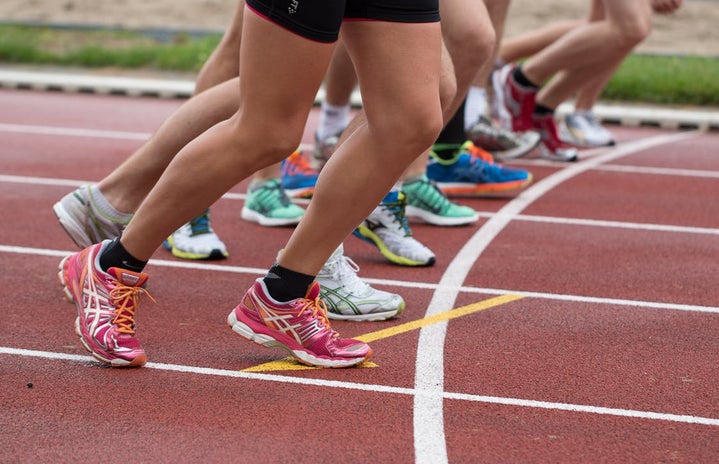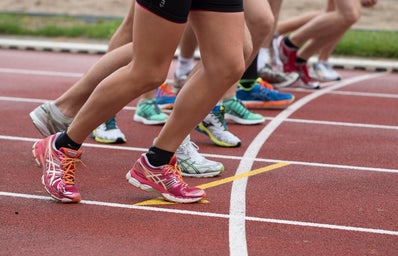Content warning: This article mentions mental illnesses, suicide, depression and other mature subject matter.
The Louisiana State University’s (LSU) championship win in the NCAA Women’s Basketball final should have been celebrated for its remarkable nature — seeing it’s the first title of its kind won in the team’s history.
Instead, the night ended with words such as “classless” trending on Twitter to describe the actions of LSU Tigers forward Angel Reese, who was seen making John Cena’s famous “you can’t see me” hand gesture towards opponent Caitlin Clark, a point guard for the Iowa Hawkeyes.
Despite Clark, a white woman, being the first to make the gesture in a different match against the University of Louisville, the only one who caught the heat for the action was Reese, a Black woman, with many online quick to refer to her with incessant stereotypes and name calling.
And it didn’t just stop at viewers. Notable people in the public eye with large platforms also took the time to criticize Reese while staying silent on Clark’s behaviour.
David Portnoy, the founder of Barstool Sports, called Reese a “Classless piece of sh*t,” meanwhile former ESPN host Keith Olbermann tweeted, “What a f*cking idiot” to a video of the LSU forward gesturing to Iowa players. Since then, Portnoy has doubled down on the label of “classless,” as seen in many of his tweets, while Olbermann has backpedalled and said both women were wrong in the action after learning more about the situation.
Many also jumped to Reese’s defence online, pointing out the double standard in treatment faced by her and Clark.
Reese has commented on the backlash she faced in a press conference following the game, stating, “All year, I was critiqued for who I was. I don’t fit the narrative.”
“I don’t fit the box that y’all want me to be in. I’m too hood. I’m too ghetto. Y’all told me that all year. But when other people do it, and y’all don’t say nothing,” she said.
Despite winning the women’s 2023 March Madness’ Most Outstanding Player award, or the fact that the game averaged about 9.9 million viewers and peaked at nearly 13 million viewers—making it the most-viewed NCAA women’s basketball game ever—all of that was overshadowed by the criticism offered to Reese over what is arguably simply a response to an opponent’s initial gesture.
However, this is not the first time such a controversy has sparked. With countless examples in the sports world, BIPOC athletes are consistently held to a higher standard than their white counterparts. It’s a story that racialized athletes know all too well.
Whether it be decorum on the court, conversations surrounding mental health, or using their platforms to speak on issues they hold dear to them, there are striking double standards for racialized athletes and even more so when it comes to racialized female athletes.
Aggression vs. frustration
During the 2018 U.S. Open, professional tennis players Naomi Osaka and Serena Williams faced off in the Women’s Singles finals match, which resulted in Osaka’s win and Japan’s first tennis Grand Slam singles championship.
It should have been a moment to celebrate Osaka and Japan’s historic win. However, reactions toward Williams became the highlight of the match.
Throughout the game, Williams was handed three code violations. First, she received a warning for a coaching violation. Then, Williams lost a point for smashing her racket. And finally, she was given a game penalty under the reasoning of “verbal abuse” towards chair umpire Carlos Ramos. As a result, the tennis star was fined $17,000 with a $10,000 deduction from her $1.85 million runner-up prize.
The “verbal abuse,” cited by Ramos, included phrases of “liar” and “thief,” stated by Williams after he accused her of cheating.
Part of the back and forth between Williams and Ramos consisted of the former wanting an apology as she said, “I have a daughter, and I stand by what’s right for her, and I have never cheated. You owe me an apology. You will never do another one of my games.”
Williams’ repercussions left a divide in thought, with some saying she received fair consequences for her actions while others said the situation was dealt with harsher than it should have been, considering other more heated exchanges where punishments were minimal or absent.
For instance, during the 2016 Cincinnati Masters in Ohio, the chair umpire of the match between British tennis player Andy Murray and Canadian tennis player Milos Raonic narrowly missed a ball to the head after Murray kicked it — which could, and arguably should have, called for penalization.
The Association of Tennis Professionals (ATP) states, “Players shall not violently, dangerously or with anger hit, kick or throw a tennis ball while on the grounds of the tournament site except in the reasonable pursuit of a point during a match.”
Despite this, Murray got only an unimpressed look from the umpire and was able to proceed with the game—which he won—as usual.
Media coverage of the incident also poked fun almost at the entire ordeal. The Australian Broadcasting Corporation said Murray “Showed off his football skills,” while USA Today wrote about Murray’s semi-final win and how “he threw in some pretty impressive soccer skills for good measure.”
One can argue that a penalty wasn’t necessary as the action wasn’t out of anger (although it was still dangerous, so the penalty is applicable), but there are other instances where heated behaviour has led to minor consequences compared to Williams.
Roger Federer swore at umpire Jake Garner in the 2009 U.S. Open by stating, “Don’t f*cking talk to me,” and “Don’t tell me when to be quiet, okay? When I want to talk, I’ll talk.”
Similarly, during the 1991 U.S. Open, Andre Agassi not only called umpire Wayne McKewen a “son of a b*tch” but also spat in his chair’s direction.
Federer received a $1,500 fine, while Agassi was fined $3,000. Although Agassi was given a penalty point for spitting, it was later taken back after a supervisor said it was unintentional.
The question that arises is, would this benefit of the doubt received by Agassi also be given to Williams if a similar occurrence were to happen to her?
Federer’s fine was based on his outburst filled with curses. Out of William’s fine, $10,000 was due to the verbal exchange between her and Ramos. So, do phrases of “liar” and “thief” trump cursing an umpire?
The lack of consistency between similar incidents in the same sport brings forth a series of criticisms regarding double standards between male and female athletes, white and racialized athletes, and the higher standards set for racialized athletes—especially Black women—to maintain certain levels of decorum on the court.
Mental health: Being open vs. being selfish
Just like any human to ever exist, athletes are not high-functioning robots who can continually and consistently perform at their peak.
Many athletes have come out to speak about poor mental health, whether due to public pressure, being in the spotlight, or other reasons. But only some end up catching flack for it.
American Olympic gold medalist Michael Plephs is one athlete who shared his struggles with suicidal thoughts and depression. The former competitive swimmer has been open about his mental health since his 2015 Sports Illustrated cover story, hoping to destigmatize conversations surrounding the topic.
Phelps partnered with online therapy service Talkspace in 2018 with a mission to “spread awareness about mental health and to let others know there is hope for healing,” according to Healthline.
Unfortunately, the sensitivity and respect Phelps received in his admission is not always the case for every athlete.
After her first-round win in the 2021 French Open, Japanese professional tennis player Naomi Osaka was fined $15,000 as a consequence of not speaking with the media. The following day, she released a statement on social media in which she explained missing the press conferences due to practicing self-care after “feeling vulnerable and anxious” and revealed dealing with depression since the 2018 U.S. Open. She then said she was going to “take time away from the court now” and withdrew from the tournament.
While there was support from viewers, other athletes and the general public, Osaka faced a magnitude of backlash with comments citing selfishness and arrogance.
Piers Morgan, an English broadcaster and journalist, called Osaka the “world sport’s most petulant little madam” in one tweet and nicknamed her “Narcissistic Naomi” in another. In his Daily Mail article, Morgan described Osaka as an “arrogant spoiled brat whose fame and fortune appears to have inflated her ego to gigantic proportions.”
Rather than considering her comments about her mental health struggles, he has completely discredited her hardships and branded her behaviour as “a stupendous ego raging out [of] control.”
He is not the only one to do so. Oliver Brown, chief sports writer for The Telegraph, called Osaka’s behaviour diva-like in an article.
The focus is on her missing the press conference rather than on why she did. It appears her explanation isn’t even considered a legitimate reason.
A few months following Osaka’s withdrawal from the tournament, Simone Biles, an American Olympic gymnast, pulled out from event finals at the 2020 Tokyo Olympics, once again, citing mental health reasons.
The criticism her withdrawal brought was immense and harmful — but not unpredictable.
From calling her selfish to a “national embarrassment,” Biles was scrutinized for prioritizing her well-being over participating in a sporting event.
Why did Osaka and Biles not face the same support and sensitivity Phelps received? Why were they first met with a wave of backlash from which they both had to defend themselves?
Despite all three athletes going through their respective experiences with mental health, it’s clear to see who faced more heat for it and who simply didn’t.
Racialized athletes are people before they are athletes. They feel and hurt all the same — with no doubt that public pressure significantly exacerbates such issues.
Although no one comes to say that their comments, criticisms or expectations have racial double standards, there are countless examples similar to Osaka and Biles’ which exhibit the same inconsiderate nature and hypocrisy.
Bringing politics into the workplace vs. *Allyship*
In August 2016, Colin Kaepernick, a former NFL quarterback for the San Francisco 49ers, refused to stand for the U.S. national anthem and instead sat on the bench, saying, “I am not going to stand up to show pride in a flag for a country that oppresses black people and people of colour. To me, this is bigger than football, and it would be selfish on my part to look the other way. There are bodies in the street and people getting paid leave and getting away with murder,” as reported by The Washington Post.
Although viewers began to notice in mid-August, it wasn’t until September that Kaepernick, alongside teammate Eric Reid, kneeled. Thus prompting a series of booing chants from the crowd and gaining national attention — and national criticism. Despite Kaepernick stating he would be donating money out of his salary to charities and that his actions were based on wanting to make America better rather than being anti-American, the backlash he faced was immense.
Kaepernick was arguably blackballed from the league, with not having been signed on an NFL team since the 2017 loss to the Seattle Seahawks. Afterwards, no team offered him a contract and in October of that year, he filed a grievance against the NFL, claiming “team owners colluded from him getting signed,” according to CNN Money. The case was resolved in 2019 after both parties “decided to resolve the pending grievances” with no further comments due to signing a confidentiality agreement.
In addition to the hit his career took, the abuse Kaepernick—and Reid at that—faced online was appalling.
Accusations of being “anti-American” from the public to former U.S. President Donald Trump and other groups didn’t stop at words. About the situation, Trump said: “Wouldn’t you love to see one of these NFL owners, when somebody disrespects our flag, to say, ‘Get that son of a b*tch off the field right now. Out! He’s fired.’”
A California police union said many officers part of the union would choose not to work in the stadiums unless the 49ers took action against Kaepernick. Frank Saunders, president of the Santa Clara Police Officers Association, said, “The 49ers are allowing this to come out from an employee, and it’s making for a hostile work environment for us at the stadium.”
While Kaepernick’s character was criticized and questioned from multiple directions, costing him his job at the time, many athletes have kneeled before during the national anthem to protest racial inequality and police brutality in the U.S.
In the same year Kaepernick knelt, Megan Rapinoe, a player on the U.S. women’s national soccer team, kneeled during the anthem before multiple international games. She acknowledged her intent behind the action to be in solidarity with the former NFL player, stating, “I think it’s actually pretty disgusting the way he was treated and the way that a lot of the media has covered it and made it about something that it absolutely isn’t.”
Notably, Rapinoe also received criticism from viewers who believed these were not expectations of a “national team player” — something reiterated by her team’s coach at the time, Jill Ellis.
However, Rapinoe’s career as an athlete remains.
The same action in the same year in the same political climate (when arguably Rapinoe’s action was on a grander scale as it was in front of an international audience). But the repercussions were dramatically different.
If Kaepernick was so egregiously immoral in his actions, why wasn’t Rapinoe?
Or if Rapinoe was exercising her first amendment as an American despite being disagreed with, why couldn’t that narrative be the prevalent one for Kaepernick?
In 2020, following the murder of George Floyd at the hands of the police, Roger Goodell, NFL commissioner, released a video statement apologizing for “not listening” to players regarding racism. Many have criticized this move as Kaepernick remains unsigned — some citing it as disingenuous, including Reid, who called it a “PR” move.
Like anyone else, athletes also have the right to speak and act on issues that matter to and impact them. They should not be punished for exercising their freedoms. However, in this scenario, it’s clear seeing a racialized athlete, especially a Black man, at the forefront of this demonstration is threatening and evokes loaded and baseless claims of being anti-patriotic or anti-American.
FINAL THOUGHTs
These few (of many) examples portray an overwhelming prevalence of the treatment of racialized athletes as unfair and held to a higher standard. It seems as though compared to their white counterparts, there’s no room for racialized athletes to feel or go through anything — whether it be anger, frustration, mental health struggles or a desire to speak up and platform their beliefs. The deep-rooted hypocrisy is seen in media coverage, online reactions, and responses from sports leagues and prominent public figures.
Black women also appear to be at the forefront of this double standard. When standing up for themselves in any way, whether on the court or off, the “angry Black woman” stereotype, in which they are labelled as “bad-tempered, hostile and overly aggressive,” is applied to their actions and ends up villainizing their behaviour.
BIPOC athletes deserve equal space to express a range of emotions, both positive and negative, without having their character ravaged in various ways. They should be able to stand up for themselves and their beliefs without fearing or anticipating drastic consequences. This does’t mean to excuse any athlete if they do something heinous, but it means to apply the same standard and repercussions to all.
But maybe we can start by giving them the space to feel.


